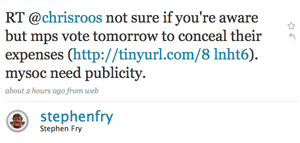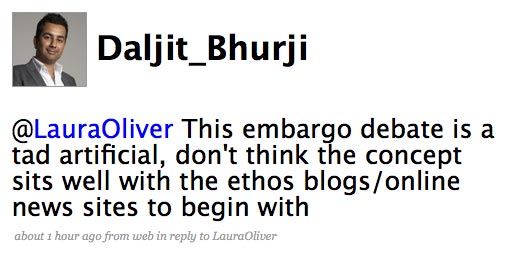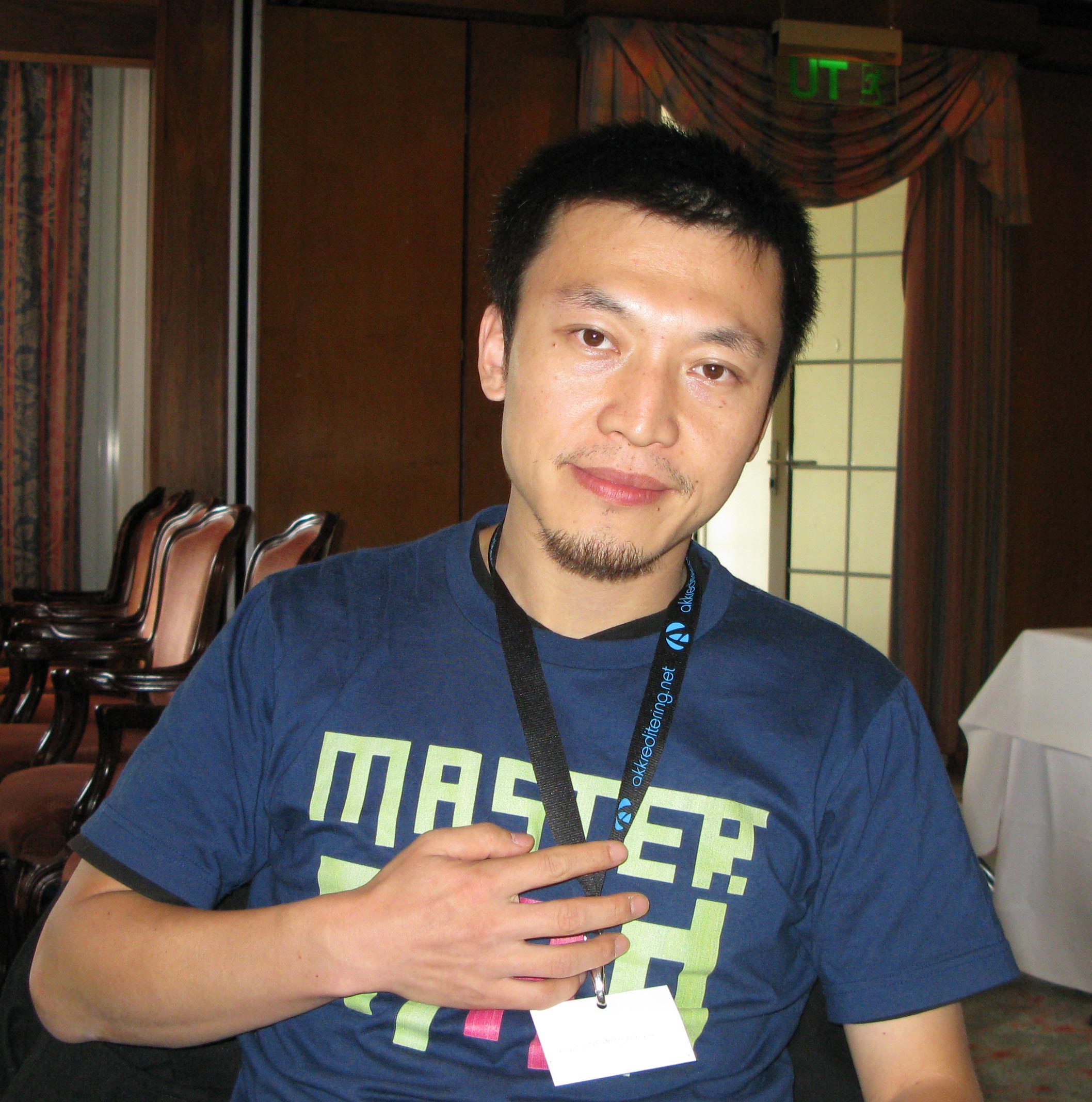Eduardo Hauser, founder of DailyMe, discusses how the site works to personalise news and whether it is responsible to do this.
Tag Archives: founder
Sea change: did online campaign group force political transparency?
It’s an interesting landmark: a quickly put-together online campaign in the UK may have influenced a political reversal. Gordon Brown has cancelled proposals for MPs to protect the details of their expenses.
The House of Commons leader, Harriet Harman, cited lack of cross-party support as the reason behind the change, according to the BBC report.
Meanwhile, the Guardian reported:
“The decision is a major victory for freedom of information campaigners and follows growing opposition led by the Liberal Democrats to the proposal, and website campaigns urging the public to email their MP objecting to the move.”
Does this show something of a sea change in political influence? Note that the campaigners directly mobilised their supporters, without reliance on mainstream media.
Tom Steinberg, founder of My Society, the organisation behind the campaign, thinks traditional media manipulation tools had little effect.
He comments on the MySociety blog:
“This is a huge victory not just for transparency, it’s a bellweather for a change in the way politics works. There’s no such thing as a good day to bury bad news any more, the internet has seen to that.”
Matthew Cain, over on his BacAtU blog, gives five reasons why he believes the campaign had clout, and points out that Stephen Fry helped the cause too… with a humble re-tweet on Twitter:

But, also today, a reminder of the way media connections have traditionally worked, with the appointment of a new head of political lobby, the Financial Times’ Jean Eaglesham. But how much influence and inside knowledge does the lobby have anymore?
“Eaglesham dismissed any suggestion that the need for constant ‘rolling’ news has diminished the quality of parliamentary reporting.
“She said: ‘Clearly it’s a risk we’re all aware of, however, now we also have the added value of more analysis and breaking news through blogging and other online content. Things change so fast now, it’s fascinating.'”
The role of the lobby was discussed at the end of last year in the House of Lords. Hazel Blears talked about the influence of the political bloggers in November, in an address to the Hansard Society.
Newsosaur: Local online advertising’s fatal flaws
Dave Chase, founder of Microsoft’s Sidewalk.com, points out the ‘five fatal flaws’ in local online ad sales, including a revenue side of the operation which does not match the innovation happening in ad production and funding.
This post is embargoed until 12:55pm (GMT), Dec 18 2008
TechCrunch’s announcement that it will break every embargo it agrees to has caused something of a stir amongst PR and journo bloggers alike.
TC’s Michael Arrington explained the good, the bad and the ugly side of embargoed news releases:
“A lot of this news is good stuff that our readers want to know about. And we have the benefit of taking some time during the pre-briefing to think about the story, do research, and write it properly. When embargoes go right, we get to write a thoughtful story which benefits the company and our readers.
“But there’s a problem. All this stress on the PR firms put on them by desperate clients means they send out the embargoed news to literally everyone who writes tech news stories. Any blog or major media site, no matter how small or new, gets the email. It didn’t used to be this way, but it’s becoming more and more of a problem. As the economy turns south, PR firms are under increasing pressure to perform and justify their monthly retainers which range from $10,000 to $30,000 or more. In short, they have to spam the tech world to get coverage, or lose their jobs.”
Increased competition in the journalism industry is causing more and more embargoes to be broken, argues Arrington, creating ‘a race to the bottom by new sites’ and a climate in which, he says, TC can’t operate.
Certain ‘trusted’ companies and PR firms will continue to have their embargoes honoured by the site, but the hope is that by disregarding the rules firms will have to be more selective with who they break news to and clamp down on those repeat offenders breaking embargoes.
Arrington will also be posting a blacklist – now topped by TC – listing all firms and publications involved when an embargo is broken.
ReadWriteWeb has come back on Arrington’s decision, saying it will honour embargoes. While the site agrees that the press should get better at respecting them, RRW says embargoes give more outlets a chance to cover a story, providing multiple perspectives for readers.
“They give multiple blogs a chance to review a technology in depth, instead of making it a race (…) Embargoes lead to more total coverage than exclusives (…) Exclusives are the tactic of people with weak products and of reporters who compete better in bullying than in writing.”
Journalism.co.uk receives its fair share of embargoed news and releases – and has never knowingly broken any, because we want to cultivate good relations with tipsters, companies and PR firms.
This doesn’t mean we’ll cover everything that gets sent our way. We also know other journalism news sites will be getting much of the same info and agree this can make it more of a race to get the news out.
But from our perspective: we have two full-time journalists, so having good contacts with companies and PR is vital to our expanding our newsgathering.
However, as a twittered reply from @Daljit_Bhurji, founder of Diffusion PR, suggests, does the old-fashioned embargo model really work for online?

Reporting on our specialism – as I’m sure is the case with many other subject-specific publications – it’s increasingly apparent that the organisations/titles/companies we write about are becoming their own news sources. e.g. have their own press office, press release feed, blog/write about their own developments.
Sending an embargoed release about this info to us later isn’t a great help. Most of the time I’d rather learn about it if it’s covered in a blog-style like the BBC Editors blog or Guardian’s Inside blog.
We’re then free to dig deeper into that news if needs be and are given a direct line to the people behind it; or pass it on through another of our channels like Editors’ Pick.
Holding back the news tide with embargoes seems to go against the way information and news spreads online through links, official ‘leaks’ (as referred to above), blog networks etc.
What’s more it’s not just quote-unquote journalists covering news releases any more – is the industry expecting other writers and bloggers online to respect embargoes? It goes against the grain of the web.
Are embargoes redundant in the online age?
[insite] – interview with semantic web expert Brooke Aker
Over at our sister blog insite, the excellent Colin Meek has conducted the second interview in his series on the semantic web.
On the receiving end this time is Brooke Aker, founder of Acuity Software and Cipher Systems, who answers qs on semantic search, the failures of Web 2.0 and uses for Web 3.0.
More on the semantic web can be read in our feature ‘Web 3.0: what it means for journalists’.
LATimes.com: Craigslist’s Craig Newmark talks to the editors of the LA TImes
Founder of Craigslist, Craig Newmark, visited The Times for a discussion with editors and members of the paper’s editorial board for a discussion about journalism in the digital age: here’s the transcript. Newmark still reads the print edition of the New York Times over coffee each day.
Online Journalism Scandinavia: Investigative journalism conference was conference 1.0, says high-profile blogger
Some 500 investigative journalists from 86 different countries descended on Lillehammer, Norway, for the Global Investigative Journalism conference (GIJC) last week, but hardly any used social media to report live from the event.
 Isaac Mao, who is often referred to as China’s first blogger (pictured right) and has watched bloggers slowly changing China’s media landscape for the better, found the absence of livebloggers and users of microblogging sites such as Twitter surprising.
Isaac Mao, who is often referred to as China’s first blogger (pictured right) and has watched bloggers slowly changing China’s media landscape for the better, found the absence of livebloggers and users of microblogging sites such as Twitter surprising.
‘Social media should redefine journalism’
“I wish 20 per cent here would twitter rather than just one, as it makes twittering from a conference more interesting. I think the group here is really big, but I have seen three guys open Skype, and no-one, other than you, have the Twitter-screen open,” Mao told me.
The high-profile blogger and social entrepreneur thinks blogs should redefine the landscape of journalism and how broad it really is, by enabling readers to participate more in traditional media.
He is firmly of the opinion that media should not be the exclusive domain of a few prestigious journalists.
“It is like The Global Shining Light Award which was awarded here: we need everyone to be enlightened. This has been conference 1.0. I did not want to challenge it as people need time to adjust to the new reality.”
The power of Chinese bloggers
In this new reality Mao talks about, China has some 50 million bloggers (47 million at the end of 2007). Of those, only about 20 million can be described as active, but that is more than enough to make it difficult for the Chinese government to monitor all of them effectively, said Mao, who was invited to the Lillehammer conference to talk about the power of Chinese bloggers.
Mao is the founder of CNBlog.org and Social Brain Foundation, which support numerous grassroots initiatives in China, and is an associate of the Berkman Centre for Internet and Society at Harvard Law School in the US.
He is also working closely with Global Voices in China, the blog network founded by Rebecca MacKinnon and Ethan Zuckerman, and his work is particularly focused on training people in using safe ways to communicate online and empowering bloggers to do their own investigations by providing training in journalistic methods.
He thinks there has already been a great change:
“Three years ago bloggers copied traditional media, now traditional media copies bloggers. In particular, journalists do their best to steal content from lifestyle bloggers,” said Mao.
“But bloggers and journalists are not enemies to each other. In the beginning, journalists thought bloggers would steal their eyeballs, then they laughed at them; bloggers were not serious enough, not in-depth enough, now they have to cooperate with them,” said Mao.
Crossroads
China is now at an important crossroads, he says:
“We have millions of bloggers now; millions doing the same makes it tough for the government to monitor it. I am waiting for the tipping point: we are now at a crossroads. Many journalists have started their own blogs now, some even blog more than they write for the traditional media outlets they work for.
“Amateur writings occupy more and more space to try to cooperate with traditional media. The latter are unable to publish a lot of things, but they can give it to bloggers to publish,” said Mao, who hopes to see the two groups, bloggers and journalists, working together more and more.
Technorati buys blogging community Blogcritics.org
Blog search website Technorati has acquired online magazine and blogging community site Blogcritics.org.
Bloggers publish their posts on Blogcritics, which acts as a source of news and reviews ‘covering all aspects of contemporary culture and society’, to gain wider exposure, an introduction to the site explains.
According to a press release, Technorati will seek to help bloggers on Blogcritics monetise their content.
“As part of Technorati Media, we’ll be able to grow the community and further improve our platform to attract new audiences. Technorati’s mission to help bloggers and people who read blogs is the ideal complement for us,” said Eric Olsen, founder of Blogcritics, in the release.
Digg teams up with CNN’s iReport for US convention interviews
Digg is working with CNN’s citizen journalism site iReport to allow users of the social bookmarking site to pose questions to members of the Democrat and Republican conventions taking place in the US over the next two weeks.
The Digg Dialogg feature, which will be used for the first time at the conventions, lets users submit text or video questions to be put to a particular interviewee. These are then ranked by other Digg users with the top 10 posed to the subject during a live interview.
The first candidate will be Nancy Pelosi, speaker of the US Democrats’ House of Representatives, said Kevin Rose, founder of Digg, in a blog post.
According to a release from CNN, the news organisation broke the one billion barrier for page views on its politics site, which was launched last September; while its blog, the CNN Political Ticker, recorded its highest ever traffic on August 22 with more than 2.7 milion page views – driven by the announcement of presidential candidate Barack Obama’s running mate.
Deadline reporter cleared of interview impersonation charge
Lauren Crooks, a reporter with Scottish press agency Deadline, has been cleared of impersonating a court official to gain an interview.
Crooks was cleared of the charge on Friday after a year spent fighting the allegation and eight court appearances, the agency has said in a press release.
The reporter was arrested in August 2007 following an interview with an assault victim, whose case she had been covering at Edinburgh’s Sheriff Court.
Despite giving out her business card, the interviewee contacted police to say they had only agreed to the interview because Crooks she said she was a court official.
Crooks said she ‘couldn’t have been any clearer’ in making her position as a reporter known during the interview, even making requests for photographs to be set up for a Sunday newspaper
“I have spent 20 years in the Scottish media and everyone I have spoken to has expressed nothing but disbelief that this should have happened at all. I dread to think how much this ludicrous case has cost the taxpayer in wasted police, procurator fiscal and court time,” said Scott Douglas, founder of Deadline, in the release.
“Even more sinister is why a police force – already under fire for its deliberate erosion of media relations – went to such lengths to pursue a reporter and an agency with an unblemished reputation on a case which didn’t stand up to even the most basic scrutiny.”